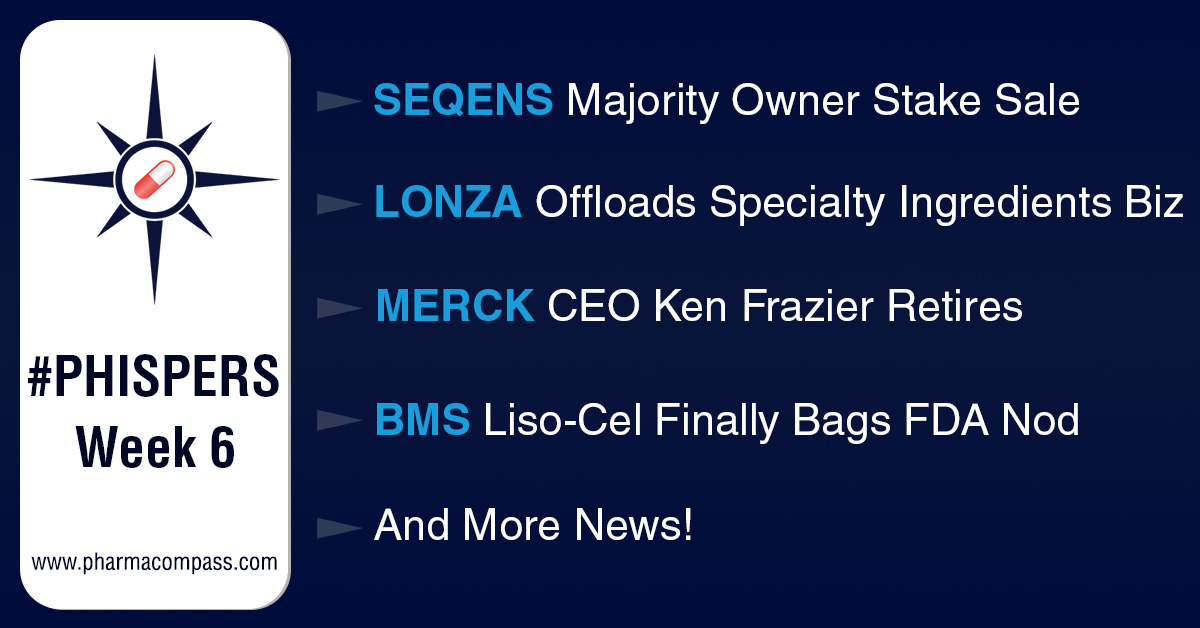
By PharmaCompass
2021-02-11
Impressions: 1895
This week, Phispers brings you lots of news from the world of pharmaceuticals that for a change, isn’t linked to Covid-19.
Merck’s outspoken CEO Ken Frazier, who took a moral stand by resigning from Trump administration’s American Manufacturing Council after the Charlottesville protest, will retire this summer.
He will be replaced by Merck’s CFO, Robert Davis. Eli Lilly’s CFO Josh Smiley resigned after an independent probe found inappropriate personal communications between him and some company employees.
Bristol Myers’ CAR-T therapy liso-cel finally bagged FDA approval for the treatment of adults with relapsed or refractory large B-cell lymphoma after at least two prior therapies.
In the US, court documents revealed how Merck knew about reports of suicidal behavior in men taking its anti-baldness treatment Propecia (finasteride).
Yet, the company decided not to warn consumers of those potential risks in a 2011 update of the drug’s label.
McKinsey has agreed to pay nearly US$ 600 million to settle a probe into its role in an opioid case.
In M&A news, the majority shareholder of Seqens is planning to sell its stake in the French drug company.
And Lonza plans to sell its ingredients unit to Bain Capital and UK private equity firm Cinven for US$ 4.67 billion.
French API manufacturer Seqens’ majority shareholder looks to sell out
Seqens, a French pharma ingredients and specialty chemicals maker that was known as Novacap until three years back, is being prepared for sale by its private equity owners who are hoping to cash in on high healthcare valuations, a Reuters report said. Seqens makes and distributes aspirin and paracetamol, among other APIs.
French investment firm Eurazeo, which is Seqens’ majority owner, has given the mandate of finding a suitable buyer for the company to JP Morgan. Seqens could be valued upwards of US$ 2.4 billion (€2 billion). This means its sale value could be 15 times its core earnings, which were around US$ 180.9 million (€150 million) for the last fiscal year.
In recent years, Seqens has expanded its footprint by buying companies such as Germany-based Uetikon, China’s Yangzi Pharm Chemical and US-based PCI Synthesis. Last year, Seqens invested US$ 35 million (€30 million) in a new API unit at its Villeneuve-La-Garenne site in France.
France pledges an additional US$ 364 million towards fighting Covid: The French government has said it will provide another US$ 364 million (€300 million) for projects to quickly increase the production of vaccines and treatments for Covid.
Last year, the French government had picked 17 projects for a total of around US$ 194 million (€160 million) of aid covering both mature and innovative medicines. With the new funds, the state aims to develop research as well as boost medicine production, expand testing and vaccination.
Lonza to offload specialty ingredients business to private equity for US$ 4.7 billion
Swiss drugmaker Lonza AG plans to offload its ingredients unit — Lonza Specialty Ingredients (LSI) — to Bain Capital and UK private equity firm Cinven for US$ 4.67 billion.
The ingredients business is one of the two pillars of Lonza’s central business. Lonza is growing its offerings in the CDMO space for biopharma and this divestment follows a reworking of the firm’s capsule business. Through this sell-off, Lonza plans to continue consolidating its business around biopharma work and capsules.
LSI is a leading provider of specialty chemicals for microbial control solutions, used to eliminate or control harmful and unwanted micro-organisms, a press statement issued by Bain Capital said. LSI’s products are critical ingredients in disinfectants, preservatives, sanitizers, personal care products, as well as in coatings and in other industrial uses.
Bain and Cinven will take over Lonza’s 17 ingredients sites around the world comprising 2,800 workers, Lonza said. The sale is expected to close in the second half of 2021.
In January, Lonza offloaded two lipid capsule production sites in Ploërmel (France) and Edinburgh (UK) as part of a plan to exit the drug capsules space while maintaining its market foothold in consumer health and nutrition.
Merck knew its anti-baldness drug was linked to suicidal behavior, say court documents
There was more news from Merck besides the retirement of Ken Frazier. In late January, a federal magistrate in Brooklyn, New York, unsealed documents and other records that revealed how Merck & Co and US regulators knew about reports of suicidal behavior in men taking the company’s anti-baldness treatment, Propecia (finasteride). Yet, they decided not to warn consumers of these potential risks in a 2011 update of the drug’s label.
The federal magistrate granted a 2019 Reuters motion to unseal 11 documents filed in years of litigation alleging that Propecia caused persistent sexual dysfunction and other harmful side effects.
Propecia was approved by the FDA in 1997 as the first drug to treat male pattern baldness. By 2009, Merck knew of more than 200 reports of depression, including suicidal thoughts, in men taking the drug.
European and Canadian regulators have mandated a warning of suicidal thoughts on the drug’s label, though they note that research has not proved that the drug causes such thoughts. The US label contains no mention of suicide or suicidal thoughts.
Since 2011, when the company decided not to warn customers through its updated label, the FDA has received over 700 reports of suicide and suicidal thoughts among people taking Propecia or generic versions of the drug. Those 700 reports included at least 100 deaths.
Over the last five years, annual US prescriptions of finasteride for hair loss have increased over two folds to more than 2.4 million in 2020, according to health data company IQVIA.
McKinsey pays US$ 600 million to settle probe into its role in opioid case
In a rare case wherein McKinsey & Company was held publicly accountable for its work with clients in the US, the consultancy firm has agreed to pay nearly US$ 600 million to settle probes into its role in helping bolster opioid sales.
The settlements come after lawsuits unearthed documents showing how McKinsey worked to drive sales of Purdue Pharma’s OxyContin painkiller during the opioid crisis in the US that has contributed to the deaths of over 450,000 people over the past two decades.
The records show that McKinsey advised Purdue to focus on selling the lucrative opioid drug even after the drugmaker pleaded guilty in 2007 to federal criminal charges that it had misled doctors and regulators about OxyContin’s risks. McKinsey also told Purdue that it could “band together” with other opioid makers to head off “strict treatment” by the US Food and Drug Administration.
According to a court filing in Massachusetts, the firm has reached a US$ 573 million agreement with attorneys general in 47 states, the District of Columbia and five territories. McKinsey has signed separate deals in Washington State (for US$ 13 million) and in West Virginia (for US$ 10 million). Nevada is not party to these agreements and will continue to pursue its opioid probe.
According to the multi-state settlement, McKinsey will not admit to wrongdoing, but will agree to court-ordered restrictions on its work with some types of addictive narcotics.
Merck CEO Ken Frazier to retire; Lilly’s CFO resigns after probe reveals inappropriate communications
Merck’s chairman and CEO Kenneth Frazier, who is one of the four black Fortune 500 CEOs and the only black CEO of Big Pharma, will retire this summer after spending almost 30 years at the drug company. In 2017, Frazier was the first to resign from Trump administration’s American Manufacturing Council after the former president made comments supporting white nationalists at the deadly protest in Charlottesville, Virginia. Frazier has been Merck’s CEO since January 2011.Merck’s current CFO, Robert Davis, will succeed Frazier and take on the post of the CEO on July 1, 2021. According to the company, Frazier will continue to serve on Merck’s board as executive chairman “for a transition period to be determined by the board.”
Frazier believes that business leaders can be a “unifying force” that can help solve racial inequalities in America by creating new opportunities and jobs. He has also said that education, particularly financial literacy, is the “great equalizer.”
Lilly’s CFO resigns: Eli Lilly’s Chief Financial Officer, Josh Smiley, resigned after an independent investigation found inappropriate personal communication between him and some Lilly employees. The company had been recently made aware of allegations of an inappropriate personal relationship between Smiley and an employee, and it took no time in hiring an external counsel to conduct an independent probe.
The investigation revealed consensual, but inappropriate personal communications between Smiley and certain Lilly employees, exhibiting poor judgment by Smiley.
“Lilly holds all employees accountable to its core values and strongly believes its executive officers carry an even higher burden in ensuring those values are upheld,” Lilly said in a statement. “Mr. Smiley did not meet that standard.”
Smiley has been with the company since 1995 and became CFO in 2018. He will be replaced by Anat Ashkenazi, who most recently was senior vice president, controller and chief financial officer of Lilly Research Laboratories.
After multiple hiccups, Bristol Myers’ CAR-T therapy liso-cel finally bags FDA nod
PharmaCompass has been routinely updating its readers on Bristol Myers Squibb’s CAR-T therapy — lisocabtagene maraleucel (liso-cel) — for the treatment of adults with relapsed or refractory large B-cell lymphoma after at least two prior therapies. In fact, Juno Therapeutics — the company that first developed liso-cel — had predicted a 2018 approval of the therapy. Celgene acquired Juno in January 2018. Celgene, in turn, was hopeful of an approval in 2019, even as the drugmaker got acquired by Bristol Myers in January 2019.The US Food and Drug Administration (FDA) approval of liso-cel by December 31, 2020 was one of the milestones of the contingent value rights (CVRs) issued upon the close of the Celgene acquisition to its investors. Since the approval never came through, Celgene investors lost out on the deal sweetener. And last week, we carried news that the FDA issued a Form 483 to a Lonza facility in Houston, which is under contract to make viral vectors for liso-cel.
However, on February 5, the FDA approved Breyanzi (liso-cel), making it the third gene therapy approved in the US for certain types of non-Hodgkin lymphoma, including diffuse large B-cell lymphoma (DLBCL).
“Today's approval represents another milestone in the rapidly progressing field of gene therapy by providing an additional treatment option for adults with certain types of cancer affecting the blood, bone marrow, and lymph nodes,” said Peter Marks, director of the FDA's Center for Biologics Evaluation and Research. “Gene and cell therapies have evolved from promising concepts to practical cancer treatment regimens,” he added.
Like other CAR-T therapies, each dose of Breyanzi is a customized treatment created using the patient’s own T-cells, a type of white blood cell, to help fight the lymphoma. The patient’s T-cells are collected and genetically modified to include a new gene that facilitates targeting and killing of the lymphoma cells. Once the cells are modified, they are infused back into the patient. The complete remission rate after treatment with Breyanzi was found to be 54 percent.
The PharmaCompass Newsletter – Sign Up, Stay Ahead
Feedback, help us to improve. Click here
Image Credit : Phisper Infographic by SCORR MARKETING & PharmaCompass is licensed under CC BY 2.0
“ The article is based on the information available in public and which the author believes to be true. The author is not disseminating any information, which the author believes or knows, is confidential or in conflict with the privacy of any person. The views expressed or information supplied through this article is mere opinion and observation of the author. The author does not intend to defame, insult or, cause loss or damage to anyone, in any manner, through this article.”








